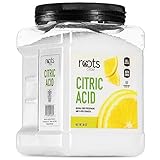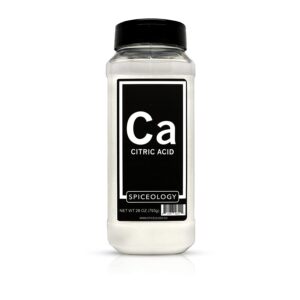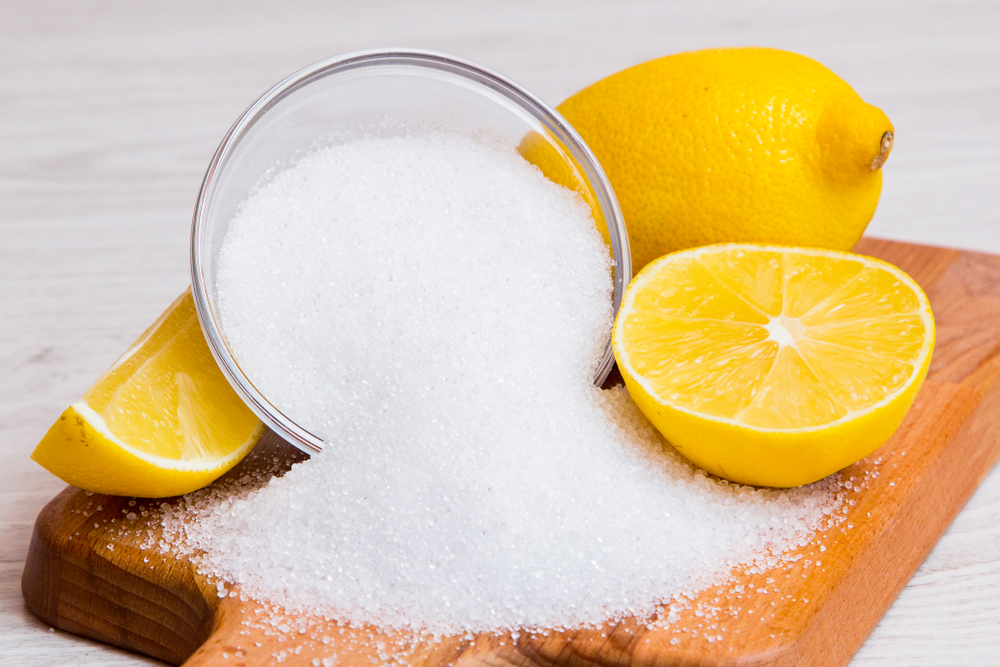Fine tuning your groceries to be 100% Whole30 is no easy feat. In fact, many of our usual items may not be acceptable on this elimination-style, temporary diet. With so many foreign additives to our foods these days, it’s hard to keep track of what is approved. Ingredients, such as citric acid, sound like an unacceptable additive, but is it really? Is Citric Acid Whole30 approved?
Citric acid is on the Whole30 approved list of added ingredients, along with others such as vegetable gums, calcium chloride, and lactic acid. Although additive-free foods are most encouraged, citric acid is approved as it does not pose any significant risk of offsetting the intended effects of the diet. The best Whole30 approved alternative to citric acid is lemon juice.
The Whole30 excludes the additives carrageenan, corn starch, monosodium glutamate (MSG), soy lecithin and sulfites. Now that we know citric acid is approved, let’s take a deeper look at its uses in foods, potential benefits and Whole30 friendly alternatives.
Contents
What is Citric Acid?
Citric acid may sound intimidating. However, it’s a natural compound found in many fruits, especially citrus fruits. Citric acid acts as a natural preservative in foods as the acid content helps to inhibit bacterial growth. This acid can also help to enhance tart flavor in various foods and is commonly seen in soft drinks, teas, juices, meats, jams, jellies, candies, canned foods, sea salts, flavoring powders, and more [1].
Citric acid has other uses besides food. You can find it in cosmetic products, skin care, cough drops, disinfecting and other cleaning agents and more. Citric acid is a useful ingredient because it contains antioxidants, detoxification benefits and disinfecting properties. Despite naturally occurring in fruits and vegetables, most food products contain a manufactured form known as MCA.
Manufactured citric acid (MCA) is made by fermenting the fungus Aspergillus Niger with molasses. This fungus is what is known to cause the black mold spots found on old fruits. Aspergillus Niger is more cost effective than natural citric acid and therefore is used in the production of 99% of the worlds production of citric acid [1, 2].
Is Citric Acid Vitamin C?
Although citric acid comes from fruits and some vegetables, it is not the same as ascorbic acid (a.k.a vitamin C). Citric acid does not contain any vitamins or minerals, however, is often confused with ascorbic acid because of its origin and similar naming.
Does Citric Acid Kill Bacteria?
Citric acid has been shown to help kill certain bacteria and viruses. This is why you may see citric acid in cleaning products and disinfectants.
Is Citric Acid Healthy?
Citric acid is not considered a health food and should not necessarily be encouraged to seek out in the diet. However, it does come with some benefits. It is encouraged to consume citric acid in its natural form, such as that found in citrus fruits, versus manufactured citric acid as there have been questions regarding its true safety as a food additive that have not yet been fully confirmed.
Citric acid, natural or man-made, can help enhance the absorption of certain minerals, such as calcium and magnesium. Because of this, supplements such as calcium citrate and magnesium citrate tend to have fewer gastrointestinal side effects that other forms, such as calcium carbonate or magnesium oxide. It also binds to urinary calcium which can help to protect against or treat the formation of kidney stones [3, 4, 5].
Although citric acid is on the Generally Recognized as Safe (GRAS) list by the Food and Drug Administration (FDA), side effects and allergic reaction in some have been reported with this food additive. This is specifically with manufactured citric acid over naturally occurring and is believed to be related to Aspergillus Niger use.
In fact, one small study found four individuals who developed joint and muscle pain, stomach pain and shortness of breath after consuming MCA but did not have the same effect when coming citric acid naturally found in citrus fruits [6].
Whole30 Approved Foods that Use Citric Acid
Below are examples of some popular Whole30 approved food items that contain citric acid in their ingredients list.
Ayoba Grass Fed Biltong Traditional Beef Slices
These grass-fed beef slices utilize citric acid in their Worcestershire powder to add tartness and help preserve the product.
Ingredients:
- Beef
- Sea salt
- Coriander
- Worcestershire powder
- Salt
- Tomato
- Vinegar
- Tamarind
- Natural flavor
- Citric acid
- Garlic
- Onion
- Pepper
- Vinegar
Nutrition Facts (per 1 package):
- Calories 180
- Fat 5g
- Saturated fat 2g
- Sodium 700mg
- Carbohydrates <1g
- Sugar 0g
- Added sugar 0g
- Fiber 0g
- Protein 31g
Spice Cave Seasoning Citrus
Spice Cave’s citrus seasoning spice contains added citric acid to add tartness and increase the concentrated citrus flavor.
Ingredients:
- Dehydrated vegetables
- Garlic
- Onion
- Parsley
- Himalayan pink sea salt
- Spices
- Lemon peel
- Citric acid
- Lemon oil
- Extractive of turmeric
Nutrition Facts (per ¼ teaspoon):
- Calories 0
- Fat 0g
- Saturated fat 0g
- Sodium 119mg
- Carbohydrates 0g
- Sugar 0g
- Added sugar 0g
- Fiber 0g
- Protein 0g
Best Brands of Citric Acid for Cooking
Roots Circle Citric Acid
 Available online on retail site such as Amazon.com, Roots Circle citric acid is an all-natural, food grade citric acid powder that is non-GMO, Kosher, and naturally gluten-free. It is priced at $13.49 for a 30-ounce container.
Available online on retail site such as Amazon.com, Roots Circle citric acid is an all-natural, food grade citric acid powder that is non-GMO, Kosher, and naturally gluten-free. It is priced at $13.49 for a 30-ounce container.
Ingredients:
- Pure citric acid
Nutrition Facts (per 1 gram):
- Calories 0
- Fat 0g
- Saturated fat 0g
- Sodium 0mg
- Carbohydrates 0g
- Sugar 0g
- Added sugar 0g
- Fiber 0g
- Protein 0g
Spiceology Citric Acid
 Although it is more expensive than Roots Circle citric acid, Spiceology is known for their innovated, chef-owned, made fresh products. You can find this citric acid online at spiceology.com for $17.99 for a 28-ounce container.
Although it is more expensive than Roots Circle citric acid, Spiceology is known for their innovated, chef-owned, made fresh products. You can find this citric acid online at spiceology.com for $17.99 for a 28-ounce container.
Ingredients:
- Citric acid
Nutrition Facts (per ¼ teaspoon):
- Calories 0
- Fat 0g
- Saturated fat 0g
- Sodium 0mg
- Carbohydrates 0g
- Sugar 0g
- Added sugar 0g
- Fiber 0g
- Protein 0g
Mountain Rose Herbs Citric Acid
For those looking for a high-quality, budget friendly option, Mountain Rose Herbs citric acid is a great option. Produced from sugarcane and cassava, this citric acid is non-GMO and available in bulk options of 1 pound, 5 pounds and 25 pounds. You can purchase Mountain Rose Herbs citric acid online at mountainroseherbs.com starting at $7.50 for a 1-pound container.
Ingredients:
- Citric acid
Nutrition Facts (per 1 gram):
- Calories 0
- Fat 0g
- Saturated fat 0g
- Sodium 0mg
- Carbohydrates 0g
- Sugar 0g
- Added sugar 0g
- Fiber 0g
- Protein 0g
Alternatives to Citric Acid in Foods
For those looking to avoid citric acid as an additive in your foods, below are some Whole30 alternatives you can consider.
Lemon Juice
If looking for an all-natural, inexpensive alternative to citric acid, why not go straight to the best source? Lemon juice, a common household ingredient, is an easy swap in various foods for citric acid. It has a sour flavor juice like citric acid, but it also contains added vitamin C from the fruit.
One lemon juiced contains about 3 grams of citric acid. If trying to replace citric acid for lemon juice in a recipe you will want to use 4-5 tablespoons of lemon juice per each tablespoon of citric acid.
Nutrition Facts (per 1 teaspoon):
- Calories 0
- Fat 0g
- Saturated fat 0g
- Sodium 0mg
- Carbohydrates 0g
- Sugar 0g
- Added sugar 0g
- Fiber 0g
- Protein 0g
Tartaric Acid
For those opposed to lemons or who simply don’t have lemon juice available to them, tartaric acid is another great alternative. Because it has a stronger taste, use ½ the recommended amount if using in place of citric acid.
Nutrition Facts (per ¼ teaspoon):
- Calories 0
- Fat 0g
- Saturated fat 0g
- Sodium 0mg
- Carbohydrates 0g
- Sugar 0g
- Added sugar 0g
- Fiber 0g
- Protein 0g
White Distilled Vinegar
With a similar sour flavor, white distilled vinegar can also be a great substitute for citric acid. It is not as strong of an acid, so you will need to start by using 2-3 times the amount called for to get the same effect as citric acid. Apple cider vinegar will also work well as a citric acid substitute.
Nutrition Facts (per 1 tablespoon):
- Calories 0
- Fat 0g
- Saturated fat 0g
- Sodium 0mg
- Carbohydrates 0g
- Sugar 0g
- Added sugar 0g
- Fiber 0g
- Protein 0g
Ascorbic Acid (Vitamin C)
Similar to citric acid, ascorbic acid is found naturally in fruits and is also known as vitamin C. Citric acid works well as a preservative and can be used on a 1:1 ratio as citric acid in recipes.
Nutrition Facts (per 1 teaspoon):
- Calories 0
- Fat 0g
- Saturated fat 0g
- Sodium 0mg
- Carbohydrates 0g
- Sugar 0g
- Added sugar 0g
- Fiber 0g
- Protein 0g
Related Questions
Will Citric Acid Break a Fast?
It depends on the form. Citric acid by itself will not break a fast. If the citric acid is in the form of lemon juice or fruits where there may be added sugars, then it will break a fast.
Can Citric Acid Hurt You?
Citric acid consumed in trace amounts found in foods has been shown to be safe. However, further research is needed on potential effects of consuming high amounts of this compound, specifically when man-made.
Is Citric Acid Low FODMAP?
Yes, citric acid is considered a low FODMAP food and acceptable for those who are on a low FODMAP diet.
